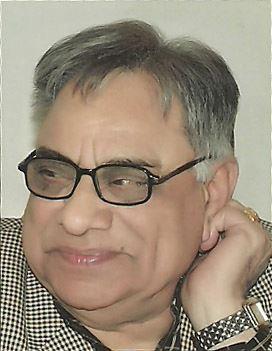Related Research Articles
Altaf Fatima was a Pakistani Urdu novelist, short story writer, and teacher. Altaf Fatima was born in Lucknow, she moved to Lahore during the Partition, earning MA and BEd from the University of Punjab. Her novel Dastak Na Do is regarded as one of the defining works in the Urdu language. An adaptation was presented on Pakistan television and an abridged translation was serialised by the Karachi monthly, Herald. In 2018, Fatima received the KLF Urdu Literature award at the 9th Karachi Literature Festival for her book, Deed Wadeed. She died on 29 November 2018.

Urdu literature comprises the literary works, written in the Urdu language. While, It tends to be dominated by poetry, especially the verse forms of the ghazal and nazm, it has expanded into other styles of writing, including that of the short story, or afsana. Urdu literature is popular mostly in Pakistan, where Urdu is the national language, and in India, where it is an Eighth Schedule language.

Ahmad Nadeem Qasmi born Ahmad Shah Awan was an Urdu language Pakistani poet, journalist, literary critic, dramatist and short story author.
Shan-ul-Haq Haqqee, Sitara-e-Imtiaz, Tamgha-e-Quaid-i-Azam, was an Urdu poet, writer, journalist, broadcaster, translator, critic, researcher, linguist and lexicographer of Pakistan.
The publishing industry in Pakistan is hampered both by a low literacy rate (65%).

Awaz Bin Sayeed Bin Awaz Bin Jabir Bin Abdullah, was a modern short-story writer, poet, playwright, Khaka-naveez and humorist from Hyderabad, India.
Ahmad Siddiq, better known by his pen name Majnun Gorakhpuri, was an Urdu short story (Afsana) writer, poet and literary critic.
Rasheed Amjad was an Urdu fiction writer, critic and scholar. He was born on 5 March 1940 in Srinagar, and migrated to Pakistan after independence, He later on lived in Rawalpindi, Pakistan.

Hussain Ul Haque was an Indian writer, Urdu critic and theorist with a Sufi approach in his thought and writings. He has received the Sahitya Akademi Award in Urdu for his novel Amawas Mein Khwab. After a short illness Hussain Ul Haque died on 24 December 2021, in Patna, Bihar.
Hassan Nisar is a Pakistani journalist, newspaper columnist, TV news analyst, and Urdu poet.

Muhammad Asim Butt is an Urdu novelist, short story writer, translator, researcher, editor, critic and journalist. He has published three novels and two collections of short stories along with a number of books translated from English into Urdu and vice versa. Butt also writes in English.
Muhammad Mansha Yaad was a writer and playwright from Punjab, Pakistan. He received the Pride of Performance award in 2005 from the Government of Pakistan. He has won many other awards from organizations in various countries which are also listed in this article.

Taleem-o-Tarbiat is a children's Urdu-language magazine published by Zaheer Salam of Ferozsons in Lahore, Punjab, Pakistan.
Haider Qureshi, Qureshi Ghulam Haider Arshad born on 1 September 1953 in Rabwah, Punjab, is a Pakistani Urdu poet, short story writer, essayist, critic, editor and journalist. He writes in Urdu.

Kewal Dheer is an Indian writer and author.
Fasih Bari Khan(Urdu: فصیح باری خان) also spelled as Faseeh Bari Khan is a television scriptwriter from Pakistan. He was born in Karachi, Pakistan. Khan is generally known for the bold portrayals of social issues in his writings. He also wrote Lollywood films also and best known for 7 Din Mohabbat In (2018). In Pakistan television industry he received critical praise for the blockbuster drama Quddusi Sahab Ki Bewah.
Naeem Tahir is a Pakistani theatre, film and television actor, scholar, public speaker, columnist, teacher and dramatist.

Mohammad Hameed Shahid born 23 March 1957 is a Pakistani Short story Writer, Novelist and literary critic (نقاد). He is well known for his fiction writings in Urdu. He was awarded the Award with Tamgha-e-Imtiaz in 2016, one of the highest literary honour given by the Government of Pakistan.
Khalida Hussain was a Pakistani fiction writer and novelist of Urdu. She introduced a new trend in Urdu fiction writing, she mostly wrote stories on real life and was regarded as the best fiction writer in Pakistan after Intizar Hussain. Khalida's novel Kaghazi Ghat was her last novel in Urdu Literature.
Umera Ahmed is a Pakistani writer, author and screenwriter. She is best known for her novels and plays Shehr-e-Zaat, Pir-e-Kamil, Zindagi Gulzar Hai, Alif, Durr-e-Shehwar, Daam, Man-o-Salwa, Qaid-e-Tanhai, Digest Writer, Maat, Kankar, Meri Zaat Zarra-e-Benishan, Doraha and Hum Kahan Ke Sachay Thay. Umera Ahmed is one of the most widely-read and popular Urdu fiction novelists and screenplay writers of this era.